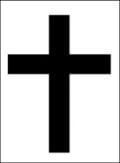One of the more overlooked issues raised by Mahmoud Abbas’ recent speech was a claim that the Palestinians are Canaanites, whose presence in the Holy Land predates the arrival of the biblical patriarch Abraham.
We shall stay here regardless of the occupation and the settlements. We shall not leave this country. This is our country. This has been our land since the days of the Canaanites. By the way, our Canaanite forefathers… The Torah says… and I do not want to go into history or geography… From the days of the Canaanites and to this day, [our forefathers] have not left this land. They were here before our patriarch Abraham. We were. Since before our patriarch Abraham…”
Abbas reiterated the claim on Wednesday. The forum: Cairo’s Al-Azhar University, regarded as Sunni Islam’s foremost institution of higher learning.
Join the fight for Israel’s fair coverage in the news
Religion plays a major part of Israeli and Palestinian narratives, but it’s rare to see the foreign press take a deeper look at the beliefs and their impact on the conflict.
So how do Palestinians, Israelis, Jews, Muslims and Christians feel about claims that:
• The Palestinians are descendants of Abraham.
• The Palestinians are descendants of Canaanites (and Natufians).
• The Palestinians predated the Canaanites.
• Jesus was a Palestinian.
• A Jewish temple never existed on the Temple Mount.
Are Jewish, Muslim and Christian leaders willing to explain the theological and political impact of these assertions? And on a different level, if one’s religious belief can’t be reconciled with a national narrative, what does that say about individual identity? I don’t have any answers.
But there are plenty of questions.
 Questions for the rabbis: Is there any reason for Jews to feel threatened by these claims? Do comments like these have an impact on interfaith dialogue, and if so, what? What do these kinds of comments mean for the Reform and Conservative rabbis who are generally more supportive of the Palestinians than their Orthodox counterparts? Do they see view Abbas’ comments as overall helpful or hurtful for peace efforts? Does Jewish law’s prohibition on Jews visiting the Temple Mount strengthen Palestinian claims on the holy site?
Questions for the rabbis: Is there any reason for Jews to feel threatened by these claims? Do comments like these have an impact on interfaith dialogue, and if so, what? What do these kinds of comments mean for the Reform and Conservative rabbis who are generally more supportive of the Palestinians than their Orthodox counterparts? Do they see view Abbas’ comments as overall helpful or hurtful for peace efforts? Does Jewish law’s prohibition on Jews visiting the Temple Mount strengthen Palestinian claims on the holy site?
 Questions for the imams: What exactly does Islam say about God’s promise of the land to Abraham’s descendants? What does Islam say about who Palestinians descended from, and what difference does it make? Does Islam in general — and Palestinians specifically — feel threatened by Jewish descent from Abraham? Is the idea of Palestinian descent from the Canaanites a long-standing Arab idea, or a relatively new assertion in response to modern Zionism? How does Hamas relate to the issue of Palestinian Canaanite identity? Can Muslim clergy in the West Bank or Gaza freely discuss these questions? In terms of of the battle within Islam between extremists and moderates, where do these claims fit in? Islam historically accepted the existence of Jewish temples on the Temple Mount — why has that changed?
Questions for the imams: What exactly does Islam say about God’s promise of the land to Abraham’s descendants? What does Islam say about who Palestinians descended from, and what difference does it make? Does Islam in general — and Palestinians specifically — feel threatened by Jewish descent from Abraham? Is the idea of Palestinian descent from the Canaanites a long-standing Arab idea, or a relatively new assertion in response to modern Zionism? How does Hamas relate to the issue of Palestinian Canaanite identity? Can Muslim clergy in the West Bank or Gaza freely discuss these questions? In terms of of the battle within Islam between extremists and moderates, where do these claims fit in? Islam historically accepted the existence of Jewish temples on the Temple Mount — why has that changed?
 Questions for the priests: Is there any reason for Christians to feel threatened by these comments? What does the church have to say about claims that Jesus was a Palestinian and the implication that he was of Canaanite descent? Do Christians feel threatened by the competing Jewish and Muslim claims to the Temple Mount? How do Christians relate to Palestinian Temple denial? It’s been reported that there’s a rift between Christians in the US and the Mideast over the Trump administration’s stance on Jerusalem — particularly that Palestinian Christians are being forced to choose between their religious and national identities. Are Abbas’ comments also forcing Palestinian Christians to make a similar choice? Do Christians around the world have a responsibility to call out Abbas if Palestinian Christians don’t have the freedom to speak out?
Questions for the priests: Is there any reason for Christians to feel threatened by these comments? What does the church have to say about claims that Jesus was a Palestinian and the implication that he was of Canaanite descent? Do Christians feel threatened by the competing Jewish and Muslim claims to the Temple Mount? How do Christians relate to Palestinian Temple denial? It’s been reported that there’s a rift between Christians in the US and the Mideast over the Trump administration’s stance on Jerusalem — particularly that Palestinian Christians are being forced to choose between their religious and national identities. Are Abbas’ comments also forcing Palestinian Christians to make a similar choice? Do Christians around the world have a responsibility to call out Abbas if Palestinian Christians don’t have the freedom to speak out?
I’m sure there are plenty more questions I haven’t thought of.
So, are any journalists out there looking for a story?
Featured image: Mahmoud Abbas by Flash90; religious symbols CC BY-SA Wikimedia Commons;
Before you comment on this article, please remind yourself of our Comments Policy. Any comments deemed to be in breach of the policy will be removed at the editor’s discretion.

